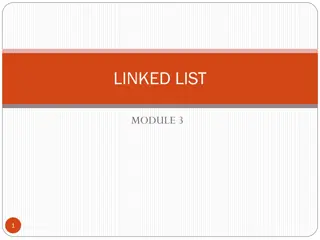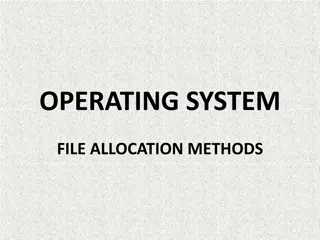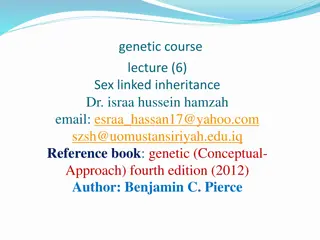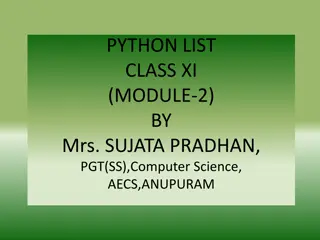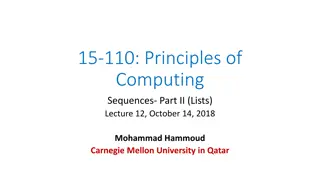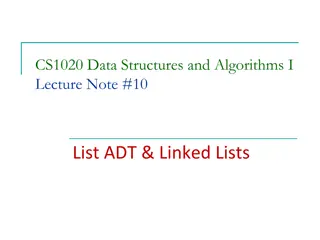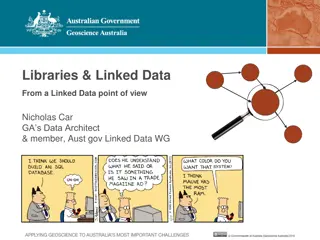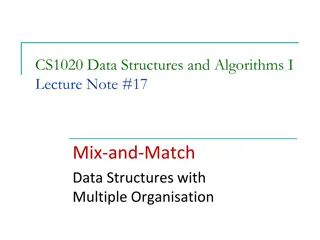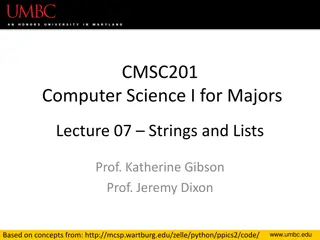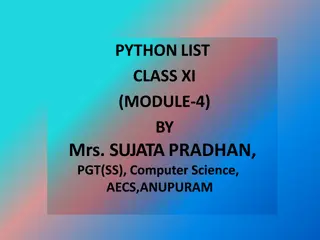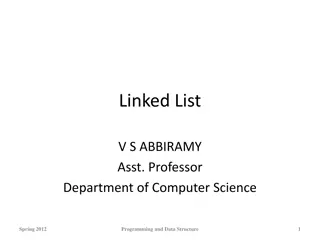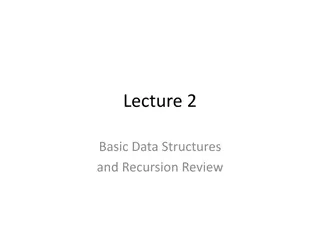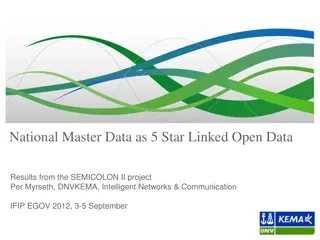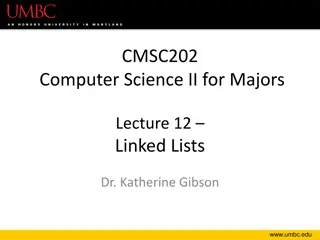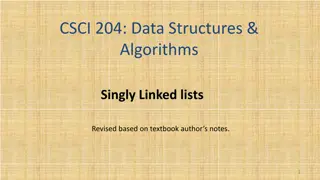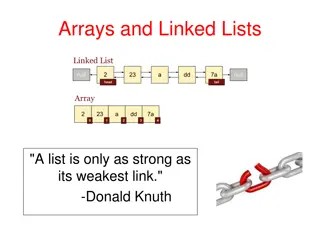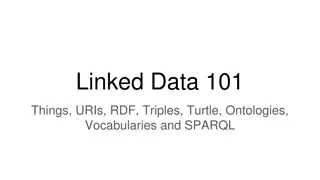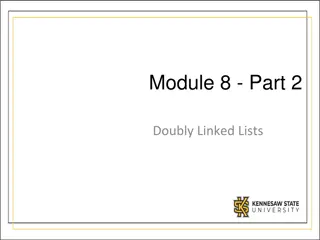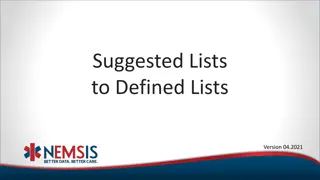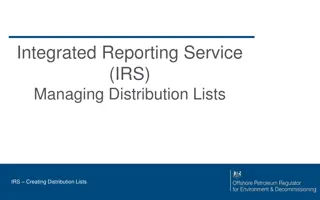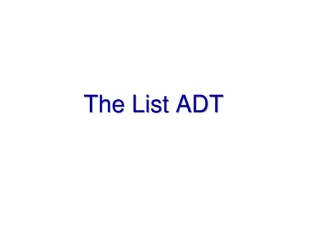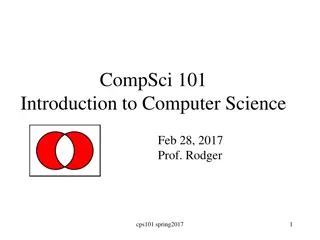LINKED LIST.MODULE 3
Explore the concept of linked lists, a linear collection of data elements represented as nodes with information and addresses to the next node. Learn about implementations, traversing, and searching algorithms in linked lists with detailed explanations and visuals.
1 views • 41 slides
Understanding Threads, Linked Lists, and Programming Models in Concurrent Programs
Delve into the concepts of threads, linked lists, and programming models in concurrent programs. Explore the use of threads for handling multiple requests, the struct types in programming, and the various access methods for lists. Learn about the benefits of threads and how they enable parallel proc
0 views • 44 slides
Operating System: File Allocation Methods
File allocation methods in operating systems determine how files are stored in disk blocks. The main methods include Contiguous Allocation, Linked Allocation, and Indexed Allocation. Contiguous Allocation involves allocating blocks in a contiguous manner for efficient disk space utilization and fast
0 views • 14 slides
Understanding Sex-Linked Inheritance: Key Concepts and Examples
Sex-linked inheritance refers to the transmission of genetic traits determined by genes located on the sex chromosomes. This type of inheritance differs from autosomal inheritance due to the unique characteristics of the X and Y chromosomes. In organisms with XX/XY sex determination, genes on the X
1 views • 21 slides
Understanding Circular Buffers and Linked Lists in Data Structures
Circular Buffers are data structures designed to efficiently manage streams of data while maintaining a fixed amount of memory usage. The buffer consists of a fixed-length array with head and tail indexes, allowing data to loop back to the beginning when the end of the buffer is reached. It is cruci
0 views • 24 slides
Python List Operations and Usage in Programming
Lists in Python are versatile data structures that allow storing an ordered sequence of items. This article covers the basics of lists, key operations such as indexing, slicing, concatenation, repetition, membership checks, and traversing lists using loops. Understanding these fundamental concepts i
1 views • 14 slides
Introduction to Creating Lists in Python
In this lecture, the focus is on lists in Python, which are more general than strings as they can contain arbitrary objects. The session covers creating lists with numbers, strings, or mixed elements using square brackets, list comprehension, and built-in list type objects. Additionally, topics such
1 views • 34 slides
Understanding Sex-Linked Inheritance in Genetics
Explore the concept of sex-linked inheritance, where traits are determined by genes on sex chromosomes. Learn about X-linked and Y-linked characteristics, the patterns of inheritance in males and females, and examples of sex-linked traits like Hemophilia and Color blindness. Understand the implicati
1 views • 24 slides
Pennsylvania's Agriculture-Linked Investment Program Overview
The Agriculture-Linked Investment Program (AgriLink Program) in Pennsylvania offers low-interest loans up to $25 million to assist farmers in implementing best management practices. The program provides benefits like a subsidized interest rate reduction for construction projects and is funded throug
2 views • 22 slides
Comprehensive Microsoft Lists Training Guide
Explore resources, best practices, and training methods for leading Microsoft Lists training sessions. Understand the training approach, key audiences, scenarios, and preferred learning methods. Get insights on engaging managers, admins, change champions, knowledge workers, and mobile workers. Enhan
0 views • 13 slides
Understanding Doubly Linked Lists in C Programming
A doubly linked list in C comprises nodes with pointers to the next and previous nodes. Managing two sets of pointers can be complex, but adds flexibility for adding and removing nodes dynamically. This post explores the structure, implementation, and examples of doubly linked lists in C.
0 views • 13 slides
Uncovering Business Models for Linked Government Data
Delve into the exploration of business models for linked government data through a comprehensive study under the European Commission's ISA Programme. Discover key stakeholders, methodologies like the Business Model Canvas, case studies, and the potential value of Linked Open Government Data. Uncover
0 views • 19 slides
Introduction to Linked Data in Geoscience Australia
Linked Data is a publishing paradigm that elevates both web pages and data to first-class citizens of the Web, enabling a global data space evolution. This concept, as explored in Geoscience Australia, involves the utilization of Semantic Web standards to promote common data formats and exchange pro
1 views • 23 slides
Satisfiability Modulo Abstraction for Separation Logic with Linked Lists
This study explores the application of satisfiability modulo abstraction in separation logic with linked lists. It presents a technique using abstract interpretation concepts to handle separation logic formulas beyond previous methods, specifically focusing on over-approximating heaps that satisfy t
0 views • 41 slides
Introduction to Resource Lists at University of Edinburgh
Explore the benefits and functionalities of Resource Lists at University of Edinburgh, a service utilizing Talis Aspire to create and manage reading lists. Learn how to create lists, add bookmarks, and access core reading materials easily. Discover the system's flexibility, collaborative features, a
0 views • 19 slides
Understanding List Operations in Python
A comprehensive guide to list operations in Python, covering topics such as defining lists, performing functions on lists, indexing, slicing, and more. Learn about the basics of lists, initializing lists, updating elements within a list, deleting list elements, and common list operations like concat
0 views • 26 slides
Understanding List ADT and Linked Lists
This content emphasizes on the List ADT and Linked Lists in the context of data structures and algorithms. It covers the definition of List ADT, implementations using arrays and linked lists, Java API LinkedList class usage, and various types of linked lists such as BasicLinkedList, EnhancedLinkedLi
0 views • 82 slides
Understanding Linked Data: Building a Semantic Web Ecosystem
Explore the world of Linked Data from the perspective of Nicholas Car, a data architect and member of Aust.gov Linked Data WG. Uncover the significance of Linked Data, its role in evolving the web into a global data space, and the Australian Govt. Linked Data Working Group's initiatives. Dive into i
0 views • 47 slides
Understanding X-Linked Inheritance and Diseases
X-linked inheritance involves genes on the X chromosome, leading to unique inheritance patterns and characteristics. X-linked diseases vary in expression between males and females due to differences in chromosome composition. X-linked dominant traits are rare but can have significant impacts on affe
1 views • 21 slides
Introduction to Linked Lists: An Overview of LinkedIntList
This lesson delves into Linked Lists by introducing the LinkedIntList and its implementation with a chain of linked nodes. Understanding the concept of LinkedIntList, its methods like add, get, indexOf, remove, size, and toString, as well as how it maintains references to its front, is crucial. Thro
0 views • 44 slides
Mix and Match Data Structures for Efficient Algorithms
Discover how to combine basic data structures like arrays, linked lists, and trees to create specialized data structures for various applications. Explore the concept of mix-and-match data structures with multiple organizations to implement efficient algorithms like adjacency lists and matrices for
0 views • 12 slides
PuReMD Design - Initialization, Interactions, and Experimental Results
PuReMD Design involves the initialization of neighbor lists, bond lists, hydrogen bond lists, and coefficients of QEq matrix for bonded interactions. It also implements non-bonded interactions such as charge equilibration, Coulomb's forces, and Van der Waals forces. The process includes the generati
0 views • 23 slides
Understanding Linked Genes and Genetic Mapping in Inheritance
Linked genes inherited together on chromosomes influence genetic traits. Discover the differences between sex-linked and linked genes, the concept of crossing over, linkage mapping, and the significance of gene distance in recombination. Explore the work of Alfred Sturtevant in gene mapping through
1 views • 21 slides
Understanding Lists and Strings in Computer Science I
In this lecture, we delve into the concepts of lists and strings in computer science, exploring their importance, representation, and built-in functionality. We discuss the utility of lists to store and manage data efficiently, compared to using individual variables for each data point. By understan
0 views • 44 slides
Efficient Interactive Proof Systems Overview
This document discusses various aspects of efficient interactive proof systems, including doubly efficient IPs, simple doubly efficient IPs, and the Sum-Check Protocol. It explains concepts such as completeness, soundness, and strategies for verifiers and provers. The content covers examples like NP
0 views • 12 slides
Exploring Python Lists in Class XI Module-4 by Mrs. Sujata Pradhan
Exploring list structures, characteristics, and operations in Python. Covering topics such as mutability, basic list operations, indexing, slicing, concatenation, repetition, traversal, updation, and comparison. Detailed explanations on list methods like append, extend, insert, index, sort, count, r
0 views • 12 slides
Comparison between Array and Linked List Data Structures
Linked lists and arrays are commonly used data structures in programming. Linked lists offer flexibility in size changes and efficient rearrangement of elements, while arrays provide direct access to elements based on their index. Linked lists involve pointers connecting elements, allowing for dynam
0 views • 24 slides
Understanding Linked Lists in Data Structures and Algorithms
Linked lists are dynamic data structures where memory can be allocated and varied during usage. They consist of nodes with data and links pointing to subsequent elements. Single, circular, and double linked lists are common types. Representation can be static using arrays or dynamic using memory man
0 views • 8 slides
Understanding Basic Data Structures and Recursion in Programming
Explore basic data structures and recursion in programming through a series of lectures covering abstract data types, list operations, array characteristics, linked lists, doubly linked lists, and circular linked lists. Dive into concepts such as array indexing, resizing, and various list implementa
0 views • 92 slides
Improving Interoperability with Linked Open Data in the SEMICOLON II Project
The SEMICOLON II project aimed to enhance eGov solutions by utilizing Linked Open Data principles to open up public registers and create semantic technologies. The project spanned from 2007 to 2013 with a budget of approximately $15 million, focusing on core national master data maintenance and moti
0 views • 25 slides
Understanding Linked Lists in Computer Science
Explore the concept of linked lists in computer science, detailing their structure, advantages, and disadvantages compared to vectors. Learn about the representation in memory, node structure, and reasons for using linked lists over other data structures.
0 views • 36 slides
Inserting a Number into a Sorted List Using Linked Lists
Implementing the task of inserting a new number into a sorted list of numbers efficiently using linked lists. The solution involves creating a linked structure where nodes are linked together in linear order, allowing for constant time operations. By utilizing linked lists, the insertion process can
0 views • 15 slides
Understanding Arrays and Linked Lists in Computer Science
Arrays and linked lists are fundamental data structures in computer science. Arrays provide a fixed-size collection, while linked lists offer dynamic sizing. Arrays are efficient for accessing elements but can be inefficient for insertions and deletions. Linked lists, on the other hand, allow for ea
0 views • 42 slides
Understanding Linked Data: Basics to Publishing and Beyond
Delve into the world of Linked Data with topics ranging from its fundamental principles like URIs, RDF, and Triples to practical aspects like publishing data using standard web technologies such as HTTP. Explore the essence of RDF graphs, the significance of naming things with URLs, and ways to prov
0 views • 26 slides
Understanding Doubly Linked Lists in Data Structures
Doubly linked lists contain nodes with both forward and backward links, allowing traversal in both directions. The nodes can be inserted or deleted at the beginning, middle, or end, requiring updating of links accordingly. Additionally, a recursive method can be used to manipulate data in each node,
0 views • 17 slides
Streamlining EMS Documentation: Defined Lists for Efficient Patient Care
EMS clinicians face challenges in documentation due to extensive lists of values. The transition from suggested to defined lists, initiated in 2016 and refined in 2019, aims to improve documentation accuracy by presenting commonly used values to providers during patient care instances. This process,
0 views • 12 slides
Managing Distribution Lists in Integrated Reporting Service (IRS)
Integrated Reporting Service (IRS) allows users with Notification Submitter privileges to create distribution lists to inform interested parties about notifications submitted. Creating distribution lists saves time by eliminating the need to repeatedly enter email addresses, ensuring all relevant pa
0 views • 5 slides
Understanding Java Generics and Linked Lists
Exploring the concepts of generic classes in Java, specifically focusing on the implementation of doubly linked lists. Discover how generics enable the creation of versatile container classes, allowing flexibility in defining container contents at instantiation. Dive into the fundamentals of linked
0 views • 25 slides
Understanding Abstract Data Types: Lists Exploration
Explore the concept of list abstract data types, different classes of lists, and various list implementations including ordered, unordered, and indexed lists. Understand how elements are organized in ordered lists based on characteristics, how unordered lists allow flexibility in element placement,
0 views • 41 slides
Introduction to List Comprehensions in Computer Science
Learn how to utilize list comprehensions in Computer Science to efficiently create new lists based on existing data. This article covers examples and explanations of list comprehensions, including building lists from other lists, applying calculations per element, and filtering elements to create sp
0 views • 21 slides
